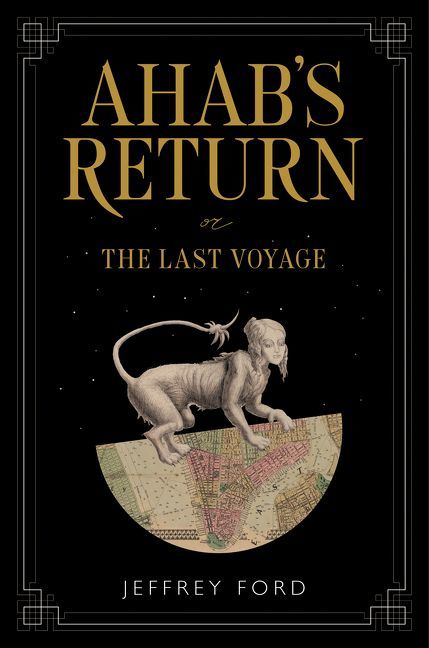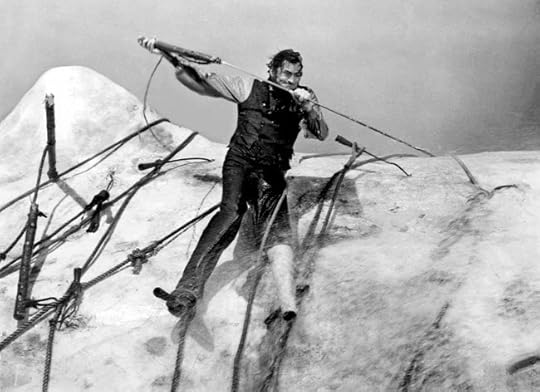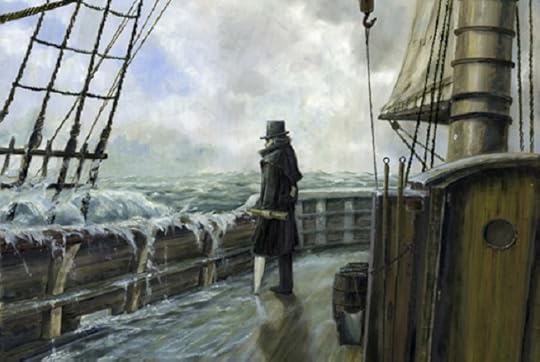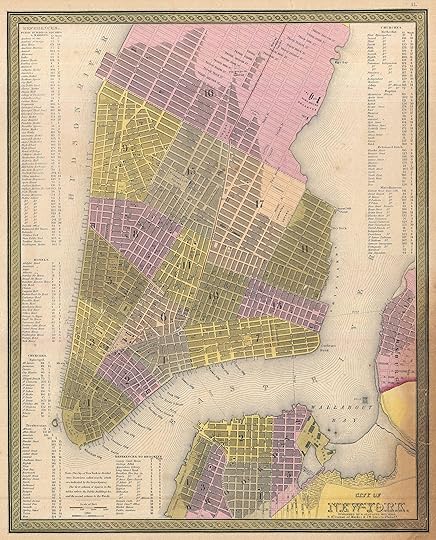What do you think?
Rate this book


272 pages, Hardcover
First published May 22, 2018
Just as despair was sinking its claws into me, there was a great bang, the flinging wide of the door to the street, which was down a short set of steps to my left. The wind rushed up from outside, rifling the papers on the office desks, guttering the weak flame in the fireplace, and extinguishing my candle. I heard the door slam shut as I groped for matches. There came a heavy tread upon the stairway, every other as sharp and as distinctive as a hammer blow. I’m afraid I’m only courageous in the articles I pen, and so my hands shook badly as I relit the wick and spun to encounter the intruder.Always on the lookout for the plume of a wonderful read, and nicely positioned at the masthead, I can honestly call out “Ahoy Mateys, off the starboard bow. Thar she blows!"


He stood in the dim light of the entranceway. His beard, his glare, his stillness put me off. He exuded a sense of tension, a spring about to snap, and stared at me imperiously as if I had intruded upon him.It takes little time for Garrick to assign Harrow to accompany Ahab on his quest, Ahab being somewhat at sea in New York. Harrow attempts to help him steer a steady course while relating the tale of their adventures to his readers. But it is rough waters into which they are headed, for Manhattan in 1853 could be as treacherous as a nor’easter on the open ocean.

If there’s one thing Ahab’s Return, or The Last Voyage isn’t, is a work of scholarship. One need not have even read Moby Dick to enjoy it. If a reader’s heard of Captain Ahab, merely heard of him, and knows he had a run in with a white whale, that’s plenty. This is not to say that the experience isn’t somewhat enhanced by the reading of what I once heard a wizened woman describe as “that wicked book.” - from Ford’s siteThe Ahab of this tale is not so much the larger-than-life fire-breathing-dragon of Melville’s novel. While he has retained some of his thunderous rage and monomaniacal drive, he is a landlubber here, out of his element, less tragic, more familial. He is looking to save his son, not seek revenge on god. He and Harrow follow the clues they find and take on the allies they can in attempting to salvage some of the captain’s life and remnant humanity.




At times, [Malbaster] was asked to speak, and it was evident he was no orator. His vocabulary was limited, but he spoke in such vague generalizations that the throngs of his compatriots found in his words enough room to nurture their own grievances and fears. His message was one of selfishness. “Life and resources and wealth are limited. They should be only for those of us who resemble those of us. All others should be driven out and/or dispatched of. A simple enough ideology for the masses.The notion of fake journalism is making the rounds today, on the one hand by the guilty looking to distract the public from reports of their crimes by claiming that all non-obsequious coverage is somehow unfair, but also nicely practiced by allies of said criminals, who have no apparent qualms about making up fantasies to feed the public, and repeating the falsehoods of their heroes. It is to a dark purpose. At least as portrayed here, the fake news of the 1853 penny press was less about securing partisan advantage than it was about securing readership with engaging, if less than entirely factual, stories.


I write to see where her story is going, to find a place where I can meet her and regain control. What I’m looking for in the storyline is a crossroads, a juncture where the boundaries of our personal tales intersect with the tales of others. I must be on the lookout for it every time I put pen to paper. And when it presents itself, I must act swiftly and decisively.There is also a scene in which Ahab’s made-up tales of the sea have a healing power. Does reality command writing or can writing command reality? Victims of the manticore are not simply killed or devoured, they are erased, as of by an author’s impulse. (reminding one of langoliers chowing down on extant reality)
